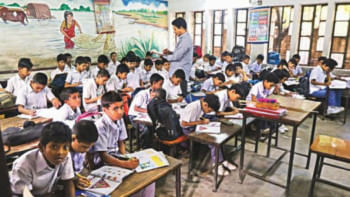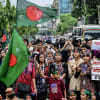Closure of schools, universities: Academic calendars in total disarray

The month-long disruption to university education and two-week long closure of schools have led to the cancellation of public and school exams, upsetting academic calendars and hampering the education of crores of students.
The government shut down all schools, colleges and universities on July 16. Activities at public universities, however, have been halted since July 1, when teachers went on work abstention to demand the reinstatement of the previous pension scheme in place of the Prottoy scheme.
Meanwhile, uncertainty hangs heavy on the academic lives of a large number of students as the reopening of secondary schools and universities are yet to be declared.
Yesterday, the primary and mass education ministry said primary schools across the country, apart from the 12 major city corporations – Dhaka North, Dhaka South, Khulna, Chattogram, Rajshahi, Rangpur, Barishal, Cumilla, Sylhet, Narayanganj, Gazipur and Mymensingh -- along with Narsingdi district, will reopen on August 4.
Meanwhile, the situation at universities took a more volatile turn as the students demonstrating for quota reforms are yet to call off their movement, while agitating teachers continue their protest.
Many public university students, especially those from colleges under the National University, said they were already facing session jams and this prolonged closure will only make matters worse.
Prof Muhammad Alamgir, acting chairman of the University Grants Commission (UGC), yesterday told The Daily Star that no decision has yet been taken regarding the reopening of universities.
Nizamul Hoque Bhuiyan, general secretary of the Federation of Bangladesh University Teachers Association, which spearheaded the teachers' protests, said, "We're protesting as this [the pension scheme issue] is a question of our [university teachers'] dignity. We'll continue our movement until our demands are met."
Education Minister Mohibul Hassan Chowdhoury said ensuring the safety of the students is the government's prime concern now.
"We're in close contact with the government authorities concerned and we'll take decisions in line with their recommendations regarding the reopening of schools and colleges," he told The Daily Star.
He said the situation in Dhaka, Narayanganj, Narsingdi and Gazipur differs from that of the rest of the country, and they will take it into consideration when making the decisions.
"However, we want to reopen schools and colleges as soon as possible."
"We understand that we're all fighting for our rights, but at the same time we need to continue our studies … It's the government's responsibility to stabilise the situation for the students as well as for the teachers."
About the teachers' protests, Mohibul said they were in talks with the teachers. "We'll request the teachers to reach a positive decision."
There are 1.98 crore students in primary level schools, 2.03 crore in secondary level and 44 lakh in all universities and affiliated colleges under public universities.
On July 1, the students took to the streets demanding reforms to the quota system in government jobs and had enforced strikes and boycott of classes and exams on all campuses indefinitely since July 6.
Their peaceful protests, however, turned violent as Bangladesh Chhatra League men attacked them on the Dhaka University campus on July 15.
Unprecedented violence and police attacks since July 16 had left at least 163 people, including students, dead (the actual number could be much higher) and thousands injured.
That very night, the education ministry declared the closure of all secondary and higher secondary level educational institutions (schools, colleges, madrasas and technical institutions), as well as polytechnic institutes until further notice. Following that, the UGC declared the closure of all public and private universities along with their affiliated colleges. It also instructed them to vacate all dormitories.
On July 17, the primary and mass education ministry issued a press release announcing the closure of all government primary schools, Child Welfare Trust-run primary schools, and Bureau of Non-Formal Education learning centres in the city corporation areas of the eight divisional cities indefinitely.
LOSSES AT PUBLIC UNIVERSITIES
Undergraduate admission seekers have been affected by the postponement of the admission processes and orientations at the Chittagong University of Engineering and Technology, Khulna University of Engineering and Technology and Rajshahi University of Engineering and Technology.
Admission tests for the cluster of nine agricultural universities for this academic year, scheduled to be held on July 20, were also postponed.
Besides, Rajshahi University authorities pushed back their undergraduate admission process on July 1 and deferred the start of the first-year honours classes.
A student of Comilla University's English department, requesting anonymity, said no classes were held at the university since early May, following a conflict between teachers and the vice-chancellor over an untoward incident at the latter's office. "Then came the teachers' movement, which further hampered the educational environment on the campus.
"We understand that we're all fighting for our rights, but at the same time we need to continue our studies … It's the government's responsibility to stabilise the situation for the students as well as for the teachers."
HSC EXAMINEES PERPLEXED
Earlier, the government postponed the HSC and all equivalent exams, scheduled between July 18 and August 1, for eight days.
Professor Tapan Kumar Sarkar, chairman of the Inter-Education Board Coordination Committee and also of the Dhaka Education Board, said, "We'll hold the postponed exams after August 11."
Meanwhile, teachers of secondary schools said the half-yearly exams, slated for July 15-24, were postponed due to the school closure and the next exams are scheduled for July 30 till August 3.
Classroom activities were disrupted during the first half of this year due to cold waves, the national election and then heat waves. So, more closures will cause more learning loss, teachers said.
Prarthona Sarker, a seventh-grader of Monipur High School and College in Mirpur, said, "It's difficult to study at home without classroom explanations. While self-study provides some understanding, it's not as effective."
Her mother, Labonno Sarker, expressed concerns about the overall situation. "School closures are harmful for the children. On the other hand, if they reopen, there's a fear of violence during the commute [to and from school], which is also a big concern."
The government was scheduled to complete the class XI admission process by July 25 and start classes on July 30.
However, the internet shutdown since the night of July 18 hindered the timely completion of admissions. The authorities concerned are now planning to start classes for newly enrolled class XI students on August 6.


 For all latest news, follow The Daily Star's Google News channel.
For all latest news, follow The Daily Star's Google News channel. 









Comments